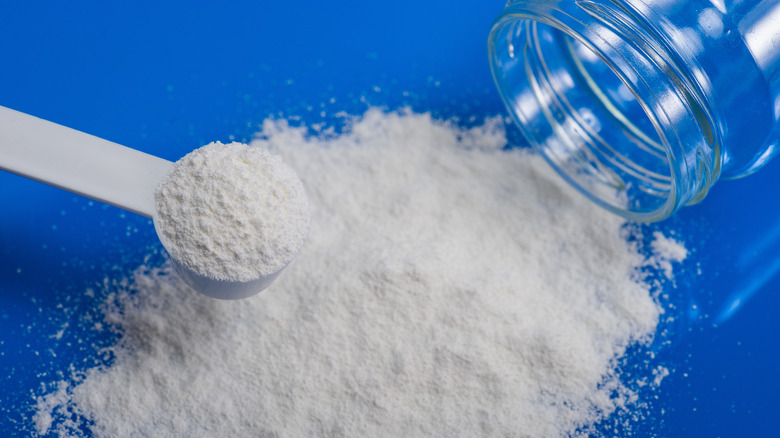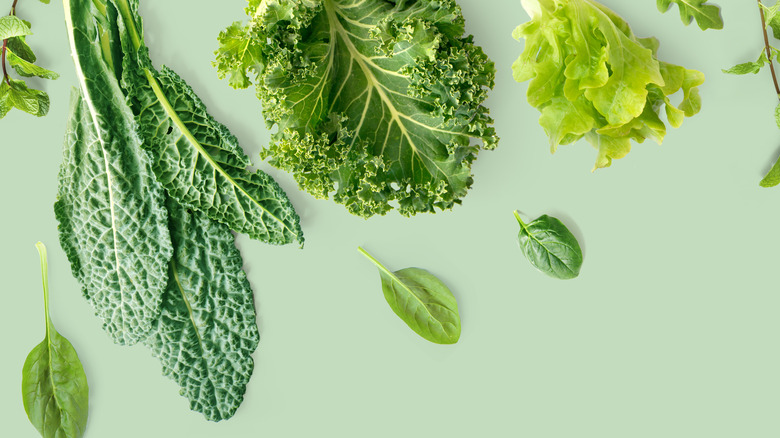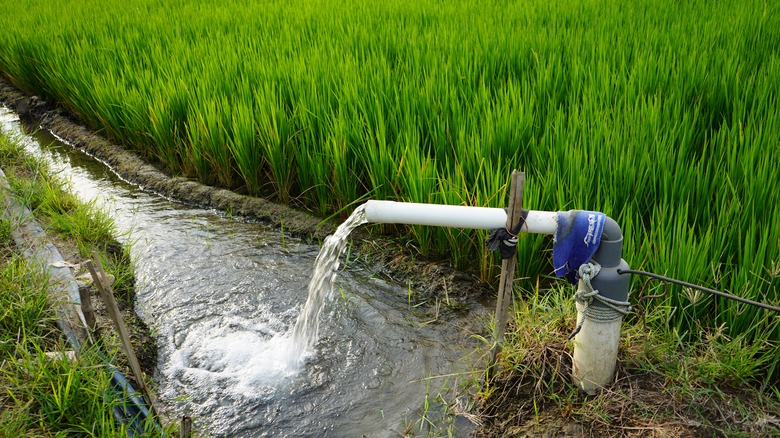What To Know About The Benefits And Risks Of Nitrates In Food
Mmmm, bacon. Was there ever anything so tasty? But did you know you are probably consuming more than just meat and salt? People have used salt to preserve meats for thousands of years (via Fermentation). But today, meat processors use chemical compounds called nitrates and nitrites to keep meat free from food-borne bacteria and help it stay fresh longer. Specifically, these chemicals are potassium nitrate and sodium nitrite, the most commonly used preservatives in meat products today.
Like salt, these chemicals remove moisture that bacteria could feed on and kill or prohibit bacteria by dehydrating them. Nitrates and nitrites also alter meat's color, flavor, and texture. But unlike salt, nitrates and nitrites could adversely affect brain and body function (per New Jersey Department of Health and Human Services). However, not all nitrates are harmful. A 2018 study in Aging and Disease suggests naturally occurring nitrates in plant-based foods can positively affect physiological function. Here's what you should know about the benefits and risks of nitrates in food.
What are nitrates?
According to Healthline, nitrates (NO3) consist of three nitrogen atoms and one oxygen atom. Dietary nitrates, like the ones found in plant foods, are relatively harmless. However, saliva breaks nitrates down when swallowed into nitrites (NO2), with one nitrogen atom and two oxygen atoms. This chemical flip can go one of two ways. Nitrates either convert to nitric oxide, which is good, or turn into nitrosamines, which is bad. A 2020 review published in Antioxidants showed that nitrosamines can cause cancer.
Which turn nitrates take seems to depend on the type of nitrate-rich food consumed. Dietary nitrates found in plant foods are high in antioxidants, and researchers believe these antioxidants counter nitrosamines' harmful effects and help protect against cancer. However, researchers concluded that eating high amounts of nitrates from animal products inhibits DNA repair and damages essential cancer control genes. This can increase your risk of cancer, especially stomach and thyroid cancers.
Where are dietary nitrates found?
Nitrates are naturally found in some vegetables, processed meats, and drinking water (per Livestrong). Each of these sources of nitrates affects the body and brain differently. A 2018 study in Aging and Disease found that vegetables, especially green, leafy ones, account for 80% to 90% of dietary nitrates. Beneficial foods containing high nitrate content include leafy vegetables like spinach, chard, lettuce, mustard greens, arugula, and kale. Root vegetables like onion, garlic, turnips, and radishes are good sources of dietary nitrates, along with watercress, kohlrabi, celery, bok choy, and Chinese cabbage.
Some fruits contain lower amounts of nitrates, including apples, oranges, peaches, pears, watermelon, kiwi, grapes, and strawberries. Beets are especially high in good nitrates, which are converted into nitric oxide through the digestive system. According to Harvard Health Publishing, nitric oxide widens blood vessels to lower blood pressure, and drinking beet juice could help manage blood pressure levels. Healthline says dietary nitrates function as antimicrobials that can kill salmonella (and other bacteria) in the gut.
However, a 2009 article in The American Journal of Clinical Nutrition advises against feeding infants home-prepared baby food made from vegetables high in nitrates, including carrots and green beans. Excess nitrates can induce hypoxia and cyanosis in babies 3 months and under.
Nitrates can contaminate water and may poison babies
Water contributes 15% to 20% of nitrate sources. Nitrates in water usually leach into private wells from runoff containing fertilizer, septic system failures, or compost piles placed too close to water sources (per Vermont Health Department). Water containing nitrate levels above 10 milligrams per liter is considered unsafe. If nitrate levels reach 5 milligrams per liter, water should be treated to reduce nitrate levels. Since you cannot see, taste, or smell nitrates in water, it is recommended that people with private water systems have their water tested for nitrates every five years.
The Environmental Protection Agency (EPA) warns nitrates cannot be boiled out of water or filtered with standard charcoal-based filters like Brita. Drinking or eating foods cooked or blended with contaminated water can make it harder for red blood cells to carry oxygen through the blood. A 2009 article in The American Journal of Clinical Nutrition advises against feeding babies home-prepared baby food made from vegetables high in nitrates, including carrots and green beans.
And babies should not drink bottles made with nitrate-contaminated water due to the risk of methemoglobinemia or "blue baby syndrome." High nitrate levels can poison babies and turn the skin a grayish-blue color. Any sign of this condition requires emergency medical attention (per Vermont Health Department).
Processed meats contain dangerous levels of nitrates and nitrites
The 2018 study in Aging and Disease says 10% to 15% of nitrate intake comes from animal products, including processed foods. The 2009 article in The American Journal of Clinical Nutrition recommends limiting consumption of fresh beef, pork, and lamb to 18 ounces per week, which do not contain nitrates or nitrites. However, the same article warns that eating any amount of processed meat containing nitrates and nitrites increases cancer risk. And the risk for colorectal cancer increases relative to the amounts of processed meats consumed.
The addition of antioxidants sodium erythorbate or sodium ascorbate (vitamin C) can reduce the risk of consuming processed meats preserved with nitrates and nitrites. WebMD recommends avoiding bacon, ham, hot dogs, and deli meat containing nitrates and nitrites, saying these meats contain the highest levels of toxic compounds. And even choosing processed meats labeled nitrate and nitrite-free does not guarantee you can avoid nitrate and nitrite content.
The United States Department of Agriculture (USDA) allows manufacturers to preserve processed meats with sources that contain natural nitrates like celery powder (via GoodRx Health). In fact, a review conducted by Consumer Reports found that of 31 different samples of packaged deli meats, the samples labeled nitrate and nitrite-free contained around the same levels of those compounds as the traditional meats.
How to minimize the risks associated with consuming nitrates
You can minimize the negative health effects of nitrates and nitrites in many ways. Start by eating plenty of fruits and veggies, including leafy greens, which contain antioxidant compounds that can protect from free radicals, inflammation, and cancer (per Harvard TH Chan School of Public Health). If you simply cannot resist the supreme deliciousness of bacon, limit your intake and try to find fresh bacon and other animal products from a farmer's market or a local supplier of pasture-raised meat.
If you buy processed meats from the grocery store, Healthline suggests checking ingredient labels for potassium nitrate, potassium nitrite, sodium nitrate, and sodium nitrite, as well as celery salt or other natural preservatives high in nitrates. And cooking bacon at a lower temperature for longer or microwaving it can reduce nitrosamine formation. Keep in mind that meats containing low or no preservative nitrates or nitrites will not last as long, so either eat them sooner or freeze them to preserve freshness.






